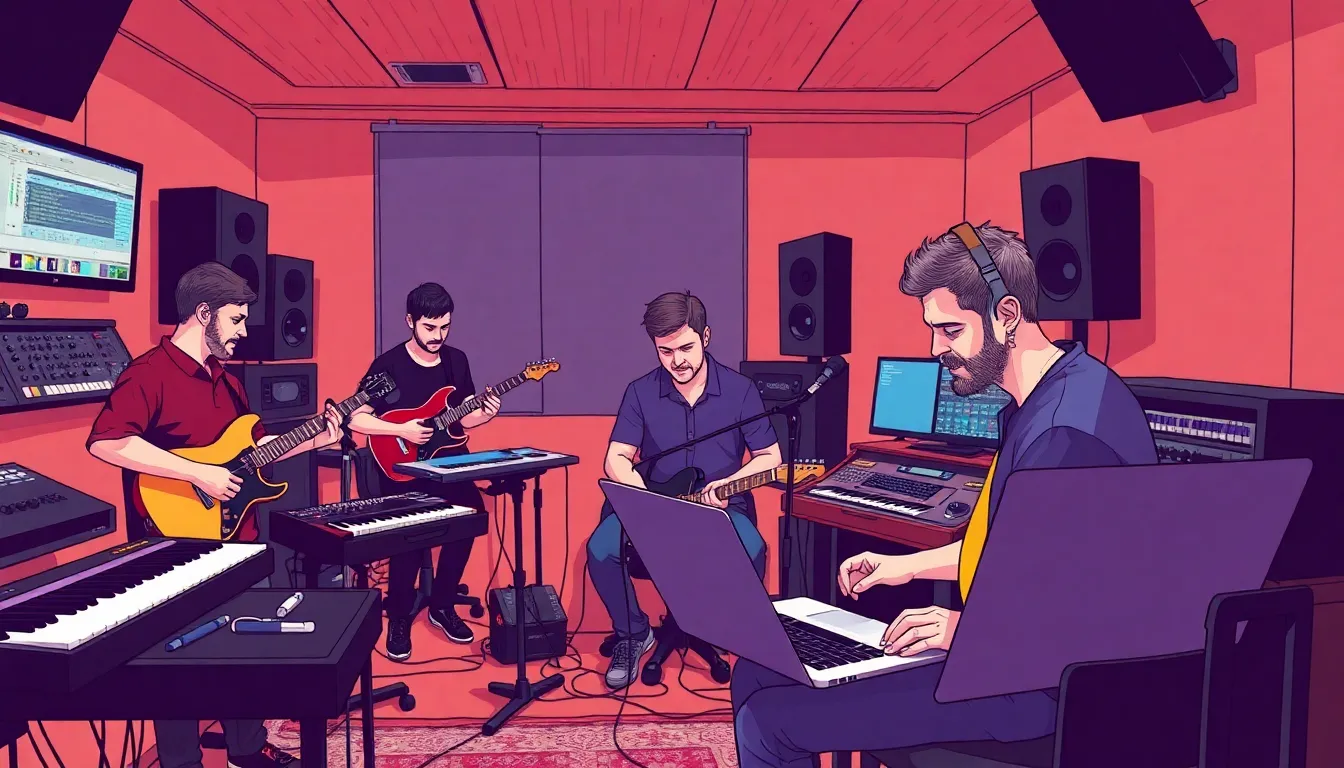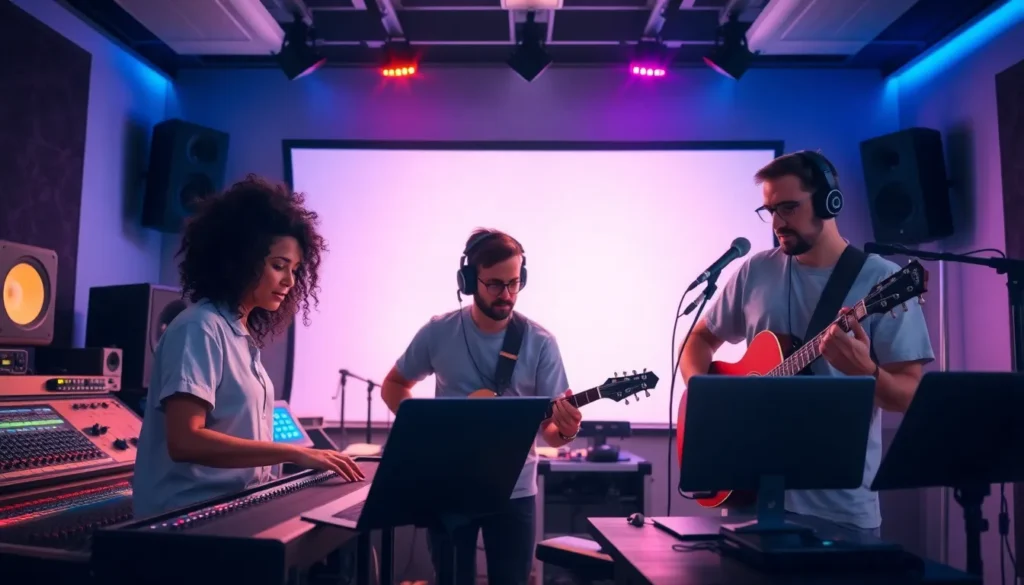In a world where music and technology dance together like a well-rehearsed duet, music technology companies are the unsung heroes behind the scenes. They’re the wizards conjuring up everything from sleek software that makes musicians sound like rock stars to hardware that turns living rooms into concert halls. If you’ve ever wondered how your favorite tunes get that extra sparkle, look no further—these companies are the secret sauce.
Music Technology Companies
Music technology companies play an important role in shaping the modern music landscape. They design audio equipment, develop software solutions, and create platforms that enhance musical creativity and performance. Innovation drives these companies, with significant advancements in fields such as digital audio workstations (DAWs), music production tools, and streaming services.
Notable companies include Avid Technology, known for its Pro Tools software that many professionals use for recording and editing. Additionally, Native Instruments specializes in software and hardware that facilitate music production and live performance. Their products enhance creativity for musicians, producers and DJs alike.
Streaming services such as Spotify and Apple Music utilize advanced algorithms to personalize user experiences. Such innovations allow listeners to discover new artists and genres tailored to their individual tastes.
Consumer electronics brands, like Yamaha and Roland, manufacture hardware that musicians rely on. Their synthesizers, mixers, and audio interfaces provide high-quality solutions for both studio and stage.
Collaboration remains a crucial aspect among music technology companies. Partnerships between firms foster advancements in technology and provide users access to improved tools. These collaborations lead to creative synergy that benefits the entire music ecosystem.
Investment in research and development enhances product offerings. Companies continually explore new technologies, including artificial intelligence and machine learning, to stay competitive. Such advancements ensure these companies remain vital to the evolution of music.
Types of Music Technology Companies

Music technology companies can be classified into two primary categories: software development companies and hardware manufacturers. Each of these sectors plays a vital role in shaping the music landscape.
Software Development Companies
Software development companies design programs that enhance musical creativity and performance. Avid Technology creates Pro Tools, a leading digital audio workstation widely used by professionals. Native Instruments offers innovative music production tools, enabling artists to craft unique sounds. Additionally, companies like Ableton specialize in live performance software, empowering musicians to engage audiences in real-time. Streaming services such as Spotify and Apple Music harness sophisticated algorithms to personalize user experiences, helping listeners discover tailored music selections. Various software solutions facilitate collaboration among artists globally, promoting seamless communication and creativity.
Hardware Manufacturers
Hardware manufacturers produce essential equipment that musicians rely on for high-quality performances. Yamaha specializes in instruments and audio equipment, supporting musicians from beginner to professional levels. Roland designs synthesizers and electronic drums that help artists create diverse sounds. Other companies, like Shure, focus on microphones and recording hardware, crucial for capturing audio fidelity. Furthermore, brands like Gibson produce iconic guitars that have defined music genres. Effective hardware enhances the overall music experience, making reliable equipment vital for creators and performers alike.
Making sure you work with people who can fully take advantage of the software and hardware is paramount for achieving the best performance possible. When coming to Vegas, musicians love working with Audio Visual Nation – your Las Vegas audio visual labor partner to ensure their stage setups, sound systems, and lighting effects are perfectly synchronized for every show. Their experienced teams understand the demands of live performances and bring technical precision that enhances both sound quality and visual presentation. With the right collaboration, artists can focus entirely on their craft while knowing every technical detail is handled flawlessly.
Innovations in Music Technology
Music technology companies consistently push the boundaries of creativity and performance. Innovations in streaming services and music production software play vital roles in shaping today’s music landscape.
Streaming Services
Providers like Spotify and Apple Music revolutionize music consumption with advanced algorithms. Listeners receive personalized recommendations based on listening habits, making discovery seamless and engaging. User interfaces prioritize ease of navigation, enhancing overall experiences. Artists, through these platforms, gain exposure to wider audiences, leading to significant revenue opportunities. Streaming services integrate social features, allowing fans to share music easily, ultimately fostering community engagement.
Music Production Software
Applications such as Avid Pro Tools and Ableton Live empower creators in production processes. These tools enable musicians to record, edit, and produce high-quality tracks efficiently. Collaboration features allow artists to work together remotely, blending their creative ideas. Sound libraries within these programs offer extensive resources, enriching compositions with diverse sounds. Music production software keeps evolving, integrating artificial intelligence capabilities that streamline workflows and inspire new musical ideas.
Challenges Facing Music Technology Companies
Music technology companies face significant challenges as they navigate a competitive landscape and navigate complex intellectual property matters. These obstacles can impact their growth and innovation.
Competition and Market Saturation
Competition among music technology companies intensifies as new firms continuously enter the market. Consumer preferences shift rapidly, and companies must adapt to meet these changing demands. Established players like Avid Technology and Native Instruments encounter constant pressure from emerging startups offering innovative solutions. Market saturation complicates differentiation as similar products flood the space. Companies need to invest in unique features and superior quality to stand out. They often seek partnerships to enhance their offerings and share resources, fostering innovation within crowded sectors.
Intellectual Property Issues
Intellectual property issues present ongoing challenges for music technology companies. Licensing agreements and copyright protections can impose significant costs and regulatory burdens. Companies create novel software and hardware, but safeguarding those creations from infringement proves difficult. Disputes over patented technologies can arise, leading to costly litigation and potential revenue loss. As digital platforms evolve, enforcing rights over music compositions becomes increasingly complex. Companies must navigate these legal landscapes to protect their innovations and maintain competitive advantages.
Future Trends in Music Technology
Emerging trends in music technology highlight the continuous evolution of audio production and consumption. Artificial intelligence increasingly plays a role in music creation and personalization. Companies like Avid Technology and Native Instruments utilize AI to enhance software features, enabling musicians to generate innovative sounds and streamline workflows.
Augmented reality and virtual reality are changing how audiences experience music. Technologies such as immersive concerts and interactive performances offer listeners unique engagement opportunities. Music technology firms are actively developing platforms to integrate these experiences into live events and streaming services.
Data analytics is becoming critical in shaping user experiences. Streaming services like Spotify and Apple Music leverage sophisticated algorithms to analyze listener preferences and behavior. Personalization techniques evolve, allowing companies to suggest new artists and genres that resonate with specific audiences.
Blockchain technology is gaining traction as a solution for copyright and licensing challenges. This decentralized system offers transparent methods for tracking ownership and rights, benefiting both artists and music technology companies. Using blockchain can reduce disputes over intellectual property and improve revenue distribution.
Collaboration among music technology companies is intensifying. Joint ventures forge partnerships that fuel creativity and innovation. Hardware producers and software developers work together to create integrated solutions that enhance the user experience from production to performance.
Sustainability is an emerging concern in music technology, with companies looking for ways to minimize environmental impact. Eco-friendly manufacturing practices and energy-efficient products are becoming priorities for leading manufacturers. As consumer awareness grows, companies that adopt sustainable practices will likely lead the market.
These trends signal a dynamic future for music technology, positioning companies to adapt and thrive as they drive the industry forward.
Conclusion
Music technology companies are pivotal in shaping the future of the industry. Their innovations not only enhance the creative process for musicians but also transform how audiences engage with music. As these companies navigate challenges like competition and intellectual property issues, their commitment to research and development remains crucial.
Emerging trends like artificial intelligence and blockchain technology are set to redefine the landscape, offering exciting opportunities for growth and collaboration. With a focus on sustainability and user experience, music technology companies are well-positioned to lead the charge into a vibrant and dynamic musical future. The evolution of music technology promises to keep pushing boundaries and enriching the global music experience.



